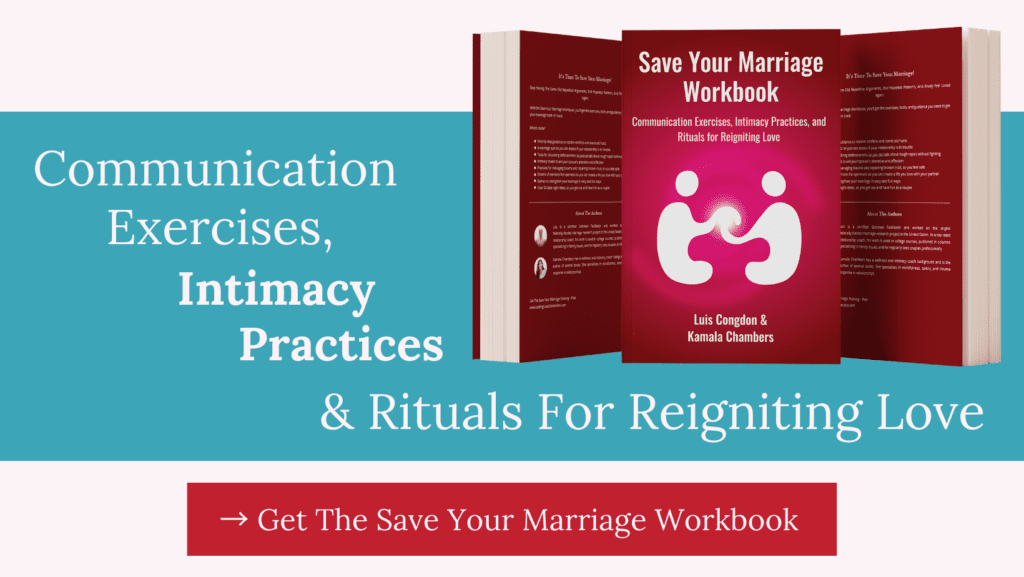There are four main stages of grief in divorce.
People don’t get married and think, “one day, I’ll get divorced.”
So, if you’re reading this, you’re feeling grief about your divorce.
Like people suffer when a loved one dies, divorce comes with stages of grief and loss. In this article, we’ll explore the stages of grief divorce brings and how to best get through those stages.
This article aims to help you move through stages of grief in your divorce with more ease, self-love, empowerment, kindness, and less fighting. And if you’re reading this as someone looking for ways to support someone you love through a divorce, this blog post will also help you.
As you read about the divorce stages of grief, take note these stages are not linear, but rather, they’re circular. Sometimes, you’ll experience one stage, move to the next, then return or circle to one of the other stages.
Moving through these stages will be hard. However, I hope to show you the stages and then offer you the best steps to avoid creating more pain for you or your family.
Related Article: Signs Your Marriage Will End In Divorce
Table of Contents
Briefly put, these are the stages of grief during and after divorce
- Denial – denying it’s happening.
- Anger – angry that it’s happening or did happen.
- Bargaining – trying to find ways to bargain your way back into the relationship. The last-ditch effort to get the relationship back.
- Depression – coming to terms there’s nothing that there is nothing you can do – Feeling the pain of it all so intensely you’re depressed.
- Acceptance is accepting that it’s happened and coming to terms with it.
Those are the typical stages outlined in all stages of grief. So whether you’ve lost someone, are getting divorced, or grieving something else, those are the five stages of grief.
My goal is to help you move through stages of grief in your divorce with more ease, self-love, empowerment, kindness, and less fighting.
This is why we’ll explore the stages more deeply and then look at where you’ll do best to put your energy into healing.
Stages Of Grief Divorce Brings – Stage One: Feeling Anger, Resentment, And Guilt (It’s Natural)
In my years working on this green earth, working with couples, I’ve never heard anyone say:
“We expected to get divorced. When we said, ‘I do,’ we expected things to end.”
Yet, the statistics show that around 39% of married couples will get divorced. And even harder to swallow, second and third marriage statistics are much higher.
For new couples, those statistics are unlikely to be comforting, and for couples going through a divorce, that data can help them understand that divorce happens.
The data around the survival rate of marriages isn’t said to paint a bleak picture, but instead that you’re not alone in your experience. To divorce is to be human.
Although you likely feel very alone, you’re not.
You’re likely feeling angry, upset, resentful, like you failed, and maybe even guilty.
You’re mourning the mistakes. The things said and done. And perhaps you’re mourning the things that will never happen.
The range of emotions can vary, but everyone who’s hired me to help them with divorce counseling shares they feel a variety of these emotions.
Sometimes someone leans more toward anger, resentment, and the desire for revenge, and other times, they feel more guilty and wish they could make things work.
Yet, the truth remains for all divorcees:
Divorce hurts.
In the first stage of grief, divorce brings sadness, pain, anger, hurt, and guilt.
No matter what you or your partner appear to feel on the outside, everyone who goes through divorce experiences the sadness that comes with the end of a relationship.
After working with hundreds of couples, I’ve learned one thing: it always helps people move through the stages of grief more easily.
Every emotion you feel is normal.
No matter how it’s showing up for you, that pain is normal. Feeling all of that is human. And it’s there to help you move through the loss.
You may not know it now, but somehow, it’s also there to bless you to the next phase of finding freedom from the pain.
Take some deep breaths if you’re in the first stage of grieving your divorce.
Inhale that pain, exhale the sadness, feel it; however it comes, hold yourself like you would a friend, and let that pain baptize you.
The grief will come and go in waves, growing and subsiding until you bit-by-bit, it gets smaller and smaller.
It may not sound comforting, but do your best to take some solace in knowing that accepting this stage of grieving your divorce is normal and even necessary.
As one break-up song says:
“I needed to hate you to love me.”
If you feel that anger, rage, and even hatred between you and your partner – know that it can get better.
If you can, don’t let that hatred toward your ex-spouse take over and drive you to revenge.
Instead, look at anger as an emotion that can help you let go, return to you, and move you towards something new.
The most important part of this first stage will be how you deal with these emotions.
You can either act out and make things worse or move on and do the work to let go.
Ideally, you find ways to ease the pain without creating more pain for you, your ex, and your children.
Stages Of Grief Divorce Brings – Stage Two: Retaliation, Power Struggle, And Wanting To Get Even
When there isn’t enough space or awareness brought to the first stage, most people act out their pain through a power struggle.
In an ideal world, couples who divorce don’t go through a nasty ordeal and drag their families and children down with them.
And the research is clear. Divorce hurts children immensely.
But it can be mitigated when both partners find healthy alternatives to fighting, seeking revenge, and trashing the other parent.
In an ideal world, couples who divorce can find healthy ways to part ways.
This is good for both people, their respective families, and their children.
That’s the ideal, but sadly, most people don’t know how to manage the stages without some level of divorce counseling.
*The link will take you to an article about divorce counseling and how it helps.

How The Power Struggle And Retaliation Plays Out
Here’s a couple’s story that illustrates how the power struggle stage plays out and leaves children to suffer.
Shawn and Sandra had been struggling in their marriage for years.
Sitting in my office, they lamented how their constant fights took a toll on their two kids. They said they wanted to make things work, but things just seemed to worsen.
Then during a counseling session, Shawn blurted out:
“I am not in love with you anymore. I want a divorce.”
Like a loaded gun, his wife fired with rage. Red.
“How dare you! You want a divorce. Fine! You will never see your kids again.”
Had the couple done this alone, it would likely have ended. Shawn would have lost most of his custody rights, and their two kids would be without a dad.
Fortunately, the couple hired me as their marriage counselor, which sometimes means I become their divorce counselor.
Holding space, I encouraged Sandra and Shawn to calm down.
Working to create a safe space, I Listened to Sandra’s pain. Then with diligence, like water gently softening a rough edge, I led her to sit and talk to her husband.
After several hours of counseling, she came to a place where she could let her husband go. She, too, saw they weren’t happy as a couple.
Then with more sessions, the couple could work out agreements to help mitigate the fights and custody battle and find ways for their kids to have both parents be present.
This story illustrates the common reaction, anger, and resentment that occurs when divorce looms.
In the case of the wife, I know her anger was her fighting for her marriage.
She didn’t want to let go.
The flurry of emotions laden with pain pushed her towards revenge, but we all know that retaliation never results in anything good. And even if it feels good temporarily, in the long run, it brings more trouble.
When we love someone, we want to fight for our marriage, but if our anger isn’t given the appropriate space, we push past it and right into something more hurtful to ourselves and those we love.
Breaking up is painful.
And those feelings of revenge are normal. In fact, many psychologists say this process helps people uncouple.
That anger, pain, and hurt work as a catalyst to help us separately. But, this stage goes awry when the anger and desire to retaliate takes over.
There are healthy ways to move through the stages of grief in divorce.
The power struggle stage in divorce doesn’t have to be plagued with nasty fights.
It’s possible for you to feel the pain of the first stage, notice the desire to retaliate, and find a healthy way to feel the pain of your divorce.
Stages Of Grief Divorce Brings – Stage Three: Regretting Your Mistakes
Here’s something hardly anyone will admit:
After divorce, everyone questions themselves.
What you see on TV and in public after divorce isn’t true. I can tell you this from the perspective of a trusted counselor for hundreds of couples.
People rarely express the vulnerable truth on television, on the radio, in books, and in public. Instead, they show the surface stuff of being angry, wanting retaliation, and the horribleness of their former partner.
Meanwhile, underneath all of that, people aren’t just feeling angry. They’re also hurting, sad, and full of regrets.
As you go through your divorce, you will experience regret.
“What if I had done it this way or that way?”
The questions will come in like a barrage. Yet, there won’t be a clear answer.
The partner who wishes things hadn’t ended and the retaliatory partner will help both wonder:
“What if I hadn’t done certain things? Could this have turned out differently?”
You’ll likely regret that you ever got married, that you were blind to your ex’s faults, or that you made inevitable mistakes that led to your divorce.
With all those questions, your mind seeks to reconcile a failed marriage. But it can’t, the relationship is over, and now it’s time to move on.
The best thing to do now is to let your mind and heart know it’s time to move on.
You can learn from the mistakes, but you can’t change what’s here now.
The relationship is over.
Now, it’s time to move on to the next stage, the stage where you take care of yourself.
Spending too much time on the, what if, won’t help you, and it won’t help you move into healing your heart.
This stage of grieving is best worked through by consciously choosing to work on yourself.
Stages Of Grief Divorce Brings – Stage Four: Finding Yourself Again
In love and marriage, one thing is guaranteed.
You will love, you will learn to compromise, you will change, and you will give a piece of yourself away.
Divorce brings people to a new reality:
You’re alone.
That person who used to be your everything is no longer. You no longer have anyone but yourself.
It’s now time to come back to you.
To bring your attention back to yourself. This is it if you’re looking for advice on healing after divorce.
Start working on yourself, start putting attention back on yourself again, give yourself what you need to heal.
Finding yourself is usually the rockiest stage of divorce, but it’s also the space where the most reward can be had.
In the process of finding yourself again, you will find:
You have friends who you lost touch with. You have a family that loves you. And you have hobbies that you gave up. Also, you have dreams and aspirations that you shelved but didn’t go away.
The road to recovery and healing is in the space of finding yourself again.
Divorce, as painful as it is, also comes with a massive release. A big wake of energy rises, and you will find the most healing in the work of finding yourself again.
This pain that you’re going through brings with it an opportunity.
You can focus on the stages of regret, revenge, and retaliation or move on to something more productive. However, finding yourself again is the best action to take now.
To find yourself, to heal again, to move on and move forward, you can:
- Hire a counselor, life coach, or trainer
- Start exploring an interest you shelved for your marriage
- Take up a hobby you’ve always wanted to try
- Start going to the gym and get in shape again
- Take up journaling. Write down your feelings, and daily gratitudes
- Buy some books on topics you have wanted to explore further
- Join a community of like-minded people (meetup.com is a good start)
- Try out different therapeutic practices (counseling, acupuncture, chiropractic, massage, etc.)
- Attend a lecture on something you’d like to learn more about
- Create a list of things you’ve wanted to accomplish, and then go and do those things.
This stage is the one I’d say you need to focus on the most.
Ideally, this stage includes counseling. Not that everyone needs counseling, but most people do.
Regretting what happened. Feeling guilty about hurting someone you care about.
Being angry and wanting retaliation.
The pain of these two can significantly be mitigated with counseling – and thus help ensure fewer problems with your ex.
Those two stages are natural and expected, but how people handle those stages makes all the difference.
The overwhelming feelings of anger and desire to get even often take over and create actions that we later regret.
That’s why moving towards healing and finding yourself is the best place to keep your focus.
By hiring a counselor as you go through these stages, you can help yourself find healing faster. Working through those regrets, bouts of anger, and the upheaval of losing your marriage will help immensely.
Most people focus and talk about the anger during and after divorce, which is fine, but we don’t find healing in the space of anger and resentment.
When given too much energy, that space only creates more pain for you and your loved ones.
Moving on requires a refocus of your energies. Moving towards working on yourself and giving yourself attention is where you will find the most momentum to get on with your new life.
Get support through the stages of grief in divorce – seek a professional counselor.
You can contact me if you’d like support in getting through the stages of grief after and during divorce.
You can call me for a consultation, or you’re welcome to book a complimentary consult. I’ve worked with countless individuals during and post-divorce. So our counseling will be tailored to your needs, and this is something I have a great depth of experience helping people do.
If you still have hope for your marriage and want to keep trying, consider the Save Your Marriage Workbook.







0 Comments